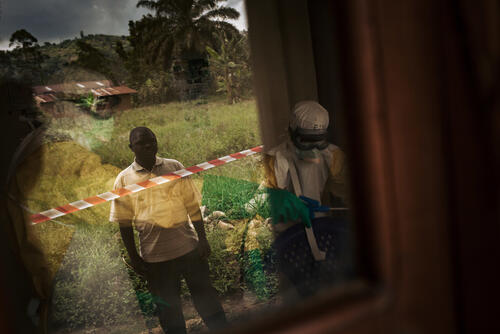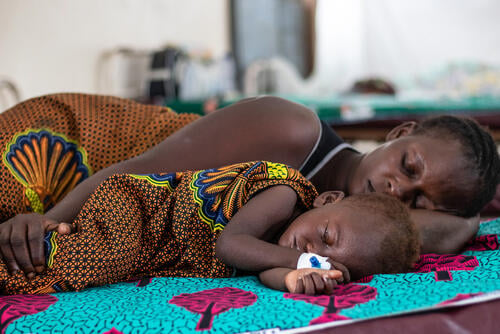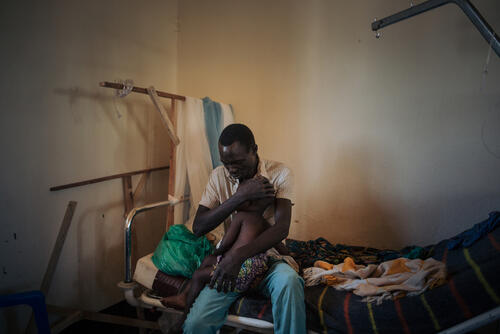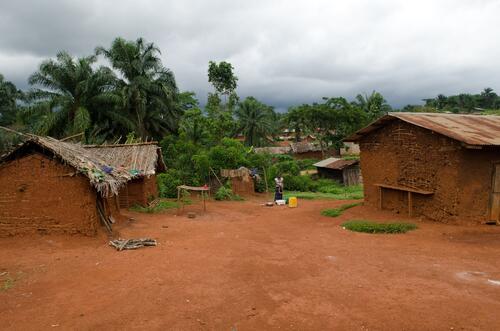As the worst Ebola outbreak in Democratic Republic of Congo’s (DRC) history approaches its second year, the number of new Ebola cases recorded each week is hovering near its highest levels since the beginning of the epidemic.
In July 2019, between 80 and 100 people were diagnosed with the disease every week. The outbreak is also continuing to spread geographically. Uganda saw its first Ebola patients in June, though they had travelled from DRC, while Goma, a city of 1.5 million people, recorded its second case just this week.
The outbreak seems headed in the wrong direction.
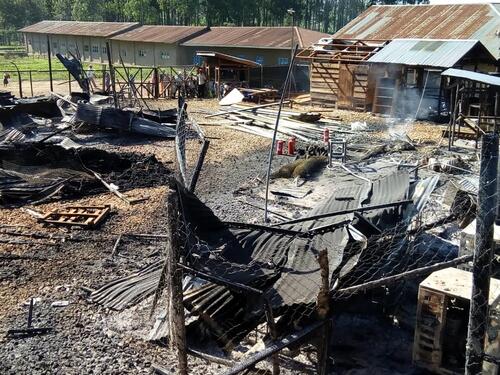
Following the declaration of the epidemic on 1 August 2018, a massive response was rapidly launched, aided by tools that were either unavailable or severely limited in previous Ebola outbreaks, such as an investigational vaccine and developmental treatments.
Despite this, the outbreak seems headed in the wrong direction and in July was declared a Public Health Emergency of International Concern (PHEIC). Since last August, Ebola has infected over 2,600 people, and killed 1,700 in DRC.
A year on, we must review what must now be done to bring the outbreak to an end.
Building trust amidst insecurity
Insecurity is frequently mentioned as one of the main challenges for the Ebola intervention. Northeastern DRC has been an area of active conflict for the past quarter century and is rife with the presence of armed groups.
Alongside this, healthcare workers associated with the Ebola response are still not trusted. They have been specifically targeted, sometimes resulting in crucial activities such as contact tracing, alert investigation or vaccination campaigns to be suspended, limited or cancelled.
Médecins Sans Frontières (MSF) knows this all too well. In February, the Ebola treatment centres in Katwa and Butembo were attacked, forcing us to withdraw our teams from those centres.
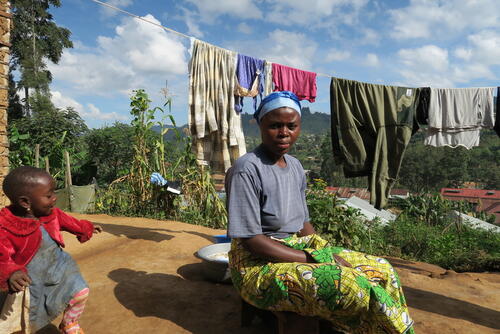
Ebola is highly lethal, poorly-understood, and often the subject of conspiracy theories that evoke a sentiment of rejection. As the outbreak is so far concentrated in a region that has long supported the political opposition, intervention from the country’s authorities is viewed with suspicion. The cancellation of presidential elections in Beni and Butembo, with the ongoing outbreak cited as the reason, did nothing to ease this tension.
The massive mobilisation of financial and human resources associated with the Ebola response marks a striking contrast to the neglect this region has suffered from over the decades.
MSF’s activities in this volatile region predate the Ebola epidemic and we have witnessed and responded to recurring crises linked to widespread violence, endemic malaria, outbreaks of measles or cholera, none of which has generated a similar sense of urgency.
This adds to the widespread belief that people’s best interests are not at the heart of the Ebola response.
There is a lot more that must be done to engage constructively with the community to improve the response.
We know that we, the respondents to the epidemic, are still failing to earn people’s participation in the response. So far, roughly a third of Ebola-related deaths have been diagnosed only post-mortem, highlighting the high numbers of people who avoid Ebola dedicated facilities.
There is a lot more that must be done to engage constructively with the community to improve the response.
Integrating the Ebola response
Set up as a ‘parallel system’, Ebola treatment and transit centres are distinctly separate from the healthcare facilities people are familiar with. As a result, they appear shrouded in mystery; seen as places where people go to die, once they’ve been separated from their families.
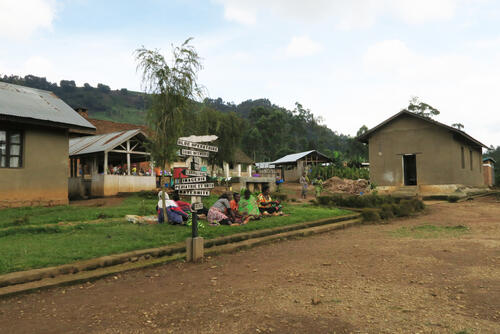
We must create conditions conducive to mutual trust and positive collaboration. This is paramount if we are to gain control of the epidemic.
The intervention must show more sensitivity for people’s concerns, fears and customs in caring for the sick and respecting the dead. We must create conditions conducive to mutual trust and positive collaboration. This is paramount if we are to gain control of the epidemic.
MSF teams are working hard to put patients at the centre of this response, adapting to the needs and expectations of people, including their preferences in terms of provision of healthcare. Patients have to be at the centre of the approach and must be given a choice about the way their health needs are managed.
This begins by acknowledging that Ebola is far from the only, or even the main, concern for many people in this region. In fact, 90 per cent of the patients admitted over the course of the year have tested negative for Ebola and likely suffered another illness.
However, these centres must improve their capacity to provide quality, individualised care during the waiting period for the Ebola tests results. Access to general healthcare is a much broader issue that needs addressing.
Patients have to be at the centre of the approach and must be given a choice about the way their health needs are managed.
What’s more, we know that many people experiencing symptoms of Ebola continue to seek healthcare at facilities they are already familiar with first. Yet these facilities have often been weakened by the reallocation of their staff to the Ebola response itself.
This is why we have worked towards an integrated Ebola response, incorporating Ebola-related activities in local health centres and general hospitals, and investing in primary healthcare, triage and isolation, hygiene and sanitation in these facilities.
This means improving provision of care for other healthcare needs such as trauma, malaria or measles, and boosting the proximity of these services to the community.
It is hoped that this will foster acceptance of Ebola-related activities by people and encourage the earlier reporting of symptoms and identification of suspect cases. The results are so far encouraging: over the course of July, as many as 10 per cent of the confirmed patients admitted to an Ebola treatment centre in Beni had been referred there from a health centre supported by MSF. This is a higher percentage than that of patients referred from dedicated Ebola transit centres.
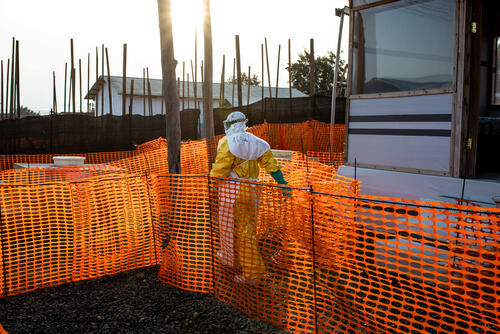
We need transparency about the availability of rVSV-ZEBOV vaccine… in terms of overall quantities… timeline of new production… and destination of the additional doses.
The advantage of available vaccines
Unlike during the West Africa Ebola outbreak in 2014-16, investigational vaccine rVSV-ZEBOV is much more available now. Over 170,000 people have received the vaccine during this outbreak through a ‘ring vaccination’ approach, which targets the contacts of confirmed Ebola patients and frontline workers.
However, increasing challenges in tracing and following-up the contacts of confirmed patients means that many people who are eligible to receive the vaccine may not be receiving it.
Furthermore, the stock of this vaccine has been limited and there is speculation about supply shortages, after doses of rVSV-ZEBOV were fractioned in May. This has limited organisations’ ability to revise and improve the vaccination strategy, even though expanding the availability of the vaccination around active outbreak areas may have a significant impact in reducing its spread.
For this reason, we need transparency about the actual availability of rVSV-ZEBOV – not just in terms of overall quantities, but also of the timeline of new production, location of storage and destination of the additional doses.
If doubts about its future availability persist, we ask the Congolese authorities to reconsider their opposition to using a second investigational vaccine to contain the outbreak.
As the outbreak enters its second year, MSF will prioritise working closely with communities to provide medical care to those who need it. We will endeavour to break down the barriers of distrust that are contributing both to the propagation of Ebola and to a potentially increased health impact of other diseases.
MSF has been active since the declaration of the epidemic, intervening in various areas of the region and on several fronts: patient care, management of suspect cases, infection prevention and control, alert investigation and health promotion. Following the attacks on the Katwa and Butembo Ebola treatment centres in February, our teams have focused on support to the local healthcare facilities, to help provision of access to care in an Ebola context and to facilitate early detection and diagnosis of Ebola cases.
Our teams are currently working to support the local healthcare infrastructure in cities such as Goma, Beni, Lubero and Kayna in North Kivu and Bunia, Mambasa and Biakato in Ituri. Support covers activities like primary healthcare, triage, isolation, infection prevention and control, water and sanitation, referrals and health promotion. We also support a 34-bed treatment centre in Bunia and a small ETC in Goma, while finalising the construction of a larger, 72-bed ETC in the city.



